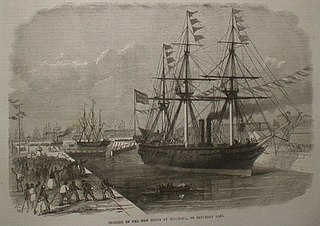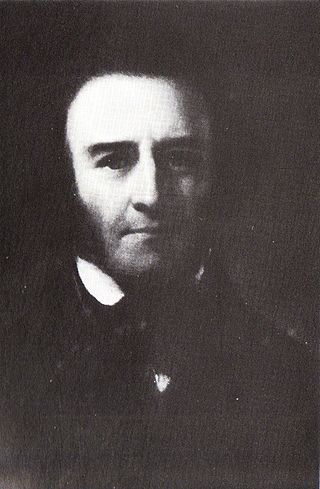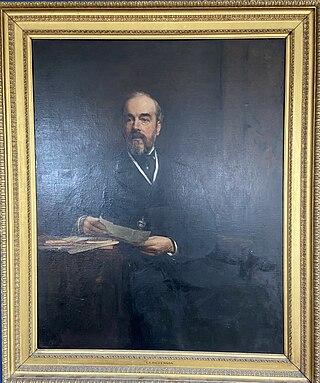Related Research Articles

Sir John Wolfe Barry, the youngest son of famous architect Sir Charles Barry, was an English civil engineer of the late 19th and early 20th century. His most famous project is Tower Bridge over the River Thames in London which was constructed between 1886 and 1894. After receiving a knighthood in 1897, he added "Wolfe" to his inherited name in 1898 to become Sir John Wolfe Barry.


Sir John Rennie FRSA was the second son of engineer John Rennie the Elder, and brother of George Rennie.

Yealmpton is a village and civil parish in the English county of Devon. It is located in the South Hams on the A379 Plymouth to Kingsbridge road and is about 8 miles (13 km) from Plymouth. Its name derives from the River Yealm that flows through the village. At the 2001 census, it had a population of 1,923, falling to 1,677 at the 2011 census. There is an electoral ward of the same name. The population of this ward in 2011 was 2,049.

Millwall Dock is a dock at Millwall, London, England, located south of Canary Wharf on the Isle of Dogs.

The Royal Albert Dock is one of three docks in the Royal Group of Docks of East London in the United Kingdom.

James Meadows Rendel FRS was a British civil engineer.

The Cornwall Railway was a 7 ft 1⁄4 in broad gauge railway from Plymouth in Devon to Falmouth in Cornwall, England, built in the second half of the nineteenth century. It was constantly beset with shortage of capital for the construction, and was eventually forced to sell its line to the dominant Great Western Railway.

Lucas Brothers was a leading British building business based in London.
Gallions was the name of two distinct railway stations that adjoined the River Thames by Gallions Reach in Beckton, east London.

The network of railways in Plymouth, Devon, England, was developed by companies affiliated to two competing railways, the Great Western Railway and the London and South Western Railway. At their height two main lines and three branch lines served 28 stations in the Plymouth area, but today just six stations remain in use.

Plymouth Friary railway station was the London and South Western Railway (LSWR) terminus in Plymouth, Devon, England.
John Aird & Co. was once a leading British civil engineering business based in London.

The Port of Tilbury is a port on the River Thames at Tilbury in Essex, England. It is the principal port for London, as well as being the main United Kingdom port for handling the importation of paper. There are extensive facilities for containers, grain, and other bulk cargoes. There are also facilities for the importation of cars. It forms part of the wider Port of London.

The Plymouth to Yealmpton Branch was a Great Western Railway single track branch railway line in Devon, England, that ran from Plymstock to Yealmpton. The line was planned as part of a route to Modbury, but the scheme was cut back to Yealmpton; it opened in 1898, and the passenger train service ran from Plymouth Millbay, but road competition led to declining usage and the passenger service was withdrawn in 1930.

The Turnchapel Branch was a London and South Western Railway (LSWR) single track branch railway line in Devon, England, that ran from Plymouth Friary station to Turnchapel. It crossed the River Plym and opened up the east side of the river to rail connections. The short line opened in 1892 and 1897 (throughout). It closed in 1951 to passengers, and in 1961 completely.

Laira Bridge is a disused railway bridge that crosses the River Plym in the city of Plymouth, Devon, England. In 2015, it was refurbished to carry a pedestrian and cycle path.

The Budleigh Salterton Railway was a single track branch railway line that ran from a junction on the Sidmouth Railway at Tipton St Johns to Exmouth via four intermediate stations: Newton Poppleford, East Budleigh, Budleigh Salterton, and Littleham. There were passing loops at Littleham and Budleigh Salterton.
Sir John Kelk, 1st Baronet was a British Conservative Party politician, builder and public works contractor.
References
- 1 2 "Portraits by the friend of Sherlock Holmes discovered in the City of Westminster" (PDF). Westminster Council. Retrieved 20 November 2019.
- ↑ "Lucas and Aird". Grace's Guide. Retrieved 20 November 2019.
- ↑ "No. 26800". The London Gazette . 4 December 1896. p. 7184.
- ↑ "Rutland's Best Bridges". pridemagazines.co.uk. 13 September 2019.
- ↑ "Royal Albert Dock". Port Cities. Retrieved 30 November 2019.
- ↑ "South Cave". Disused Stations. Retrieved 30 November 2019.
- ↑ Hill R., Hill R.H., “Sudan Notes and Records” Vol. 20, No. 1, publ. 1937, University of Khartoum, p.110.
- ↑ "Tilbury Dock". Port Cities. Retrieved 30 November 2019.
- ↑ "Blackfriars Railway Bridge". Where Thames Smooth Waters Glide. Retrieved 20 November 2019.
- ↑ The Story of the West Highland, published by the London and North Eastern Railway, 1944 (written anonymously by George Dow)
- ↑ Maggs, Colin (2011). The Branch Lines of Devon Exeter, South, Central & East Devon. Amberley Publishing. ISBN 978-1848683501.
- ↑ "Inquests". Western Morning News. 13 January 1896.
John Barwell, engine driver, in the employ of Lucas and Aird, who are constructing the railway to Yealmpton...Deceased had been in the employ of Lucas and Aird for about five months.
- ↑ "Yealmpton Branch". Old Plymouth. Retrieved 30 November 2019.